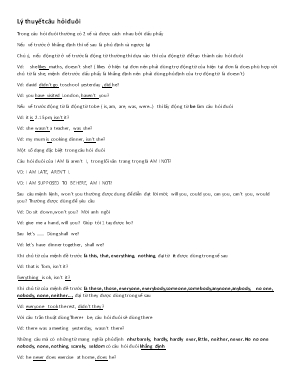Lý thuyết và bài tập câu hỏi đuôi môn Tiếng Anh Lớp 11
Bạn đang xem tài liệu "Lý thuyết và bài tập câu hỏi đuôi môn Tiếng Anh Lớp 11", để tải tài liệu gốc về máy bạn click vào nút DOWNLOAD ở trên

Lý thuyết câu hỏi đuôi Trong câu hỏi đuôi thường có 2 vế và được cách nhau bởi dấu phẩy Nếu vế trước ở khẳng định thì vế sau là phủ định và ngược lại Chú ý, nếu động từ ở vế trước là động từ thường thì dựa vào thì của động từ để tạo thành câu hỏi đuôi Vd: she likes maths, doesn’t she? ( likes ở hiện tại đơn nên phải dùng trợ động từ của hiện tại đơn là does phù hợp với chủ từ là she, mệnh đè trước dấu phẩy là khẳng định nên phải dùng phủ định của trợ động từ là doesn’t) Vd: david didn’t go to school yesterday, did he? Vd: you have visited London, haven’t you? Nếu vế trước động từ là động từ tobe ( is, am, are, was, were) thì lấy động từ be làm câu hỏi đuôi Vd: it is 2.15pm, isn’t it? Vd: she wasn’t a teacher, was she? Vd: my mum is cooking dinner, isn’t she? Một số dạng đặc biệt trong câu hỏi đuôi Câu hỏi đuôi của I AM là aren’t I, trong lối văn trang trọng là AM I NOT? VD: I AM LATE, AREN’T I. VD: I AM SUPPOSED TO BE HERE, AM I NOT? Sau câu mệnh lệnh, won’t you thường được dung để diễn đạt lời mời; will you, could you, can you, can’t you, would you? Thường được dùng để yêu cầu Vd: Do sit down, won’t you? Mời anh ngồi Vd: give me a hand, will you? Giúp tôi 1 tay được ko? Sau let’s . Dùng shall we? Vd: let’s have dinner together, shall we? Khi chủ từ của mệnh đề trước là this, that, everything, nothing, đại từ it được dùng trong vế sau Vd: that is Tom, isn’t it? Everything is ok, isn’t it? Khi chủ từ của mệnh đề trước là these, those, everyone, everybody,someone,somebody,anynone,anybody, no one, nobody, none, neither., đại từ they được dùng trong vế sau Vd: everyone took the rest, didn’t they? Với câu trần thuật dùng There+ be, câu hỏi đuôi sẽ dùng there Vd: there was a meeting yesterday, wasn’t there? Những câu mà có những từ mang nghĩa phủ định như barely, hardly, hardly ever, little, neither, never. No no one nobody, none, nothing, scarely, seldom có câu hỏi đuôi khẳng định Vd: he never does exercise at home, does he? Vd: he hardly went out when he was young, did he? I. Choose the word or phrase A, B, C or D that best completes the sentence: No one is better cook than his mother, ______? .Do it right now, ______? There are no easy ways to learn a foreign language, _______? He seldom goes to the library, ______? Let’s go for a long walk, ______? I think he will join us, _____? The film is good, _______________? You are going to the party, ____________? He can speak English, _________________ ? 10. You don’t know him,__________________ ? 11. Lan speaks Chinese very well, __________? 12. John has worked hard, _________________? 13. They invited him to the party, ___________? 14. They are leaving here tomorrow________? 15. I’m a bit late, ______? 16. No one is indifferent to praise, ______? 17. Somebody has left these socks on the bathroom floor, ______? 18. James owns a restaurant, ______? 19. You aren’t too busy to talk, ______? 20. The ticket to London doesn’t cost a lot, ______? 21. You don’t need me any more, ______? 22. Nobody knows who invited the wheel, ______? 23. Harry was working in Bristol then, ______? 24. You’ll be home before midnight, ______? 25. David is bringing some wine, ______? 27. That isn’t Bill driving, ______? 28. Nobody likes the play, __________? 29. The children can read English, __________? 30. Your grandfather was a millionaire, ______? 31. Your brother’s here, ______? 32. That was Ann on the phone, ______? 33. Tom didn't see her, ______? 34. Mary wasn't angry, ______? 35. Susan doesn't like oysters, ______?
Tài liệu đính kèm:
 tag_questions.docx
tag_questions.docx





